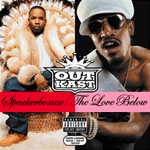Outkast – Speakerboxxx/The Love Below

At a time when mainstream hip-hop has had relatively little to offer, the members of Outkast have consistently been the genre’s most creative artists. Following their muse, André Benjamin (André 3000) and Antwan Patton (Big Boi) have kept evolving and kept it fresh. The duo began with the southern-fried hip hop of Southernplayalisticadillacmuzik (1994) and followed with the wacky, cartoonish psychedelibopalicious space-hop of ATLiens (1996). They incorporated elements of blues, jazz and soul into Aquemini (1998), on which Dré and Big Boi explored the player/poet dichotomy. Then, Outkast made the multi-platinum, Grammy-winning Stankonia (2000)—with its infectious hooks and electronic/dancehall influences, one of the most accessible rap/hip-hop records ever.
On the duo’s latest, each member explores his own musical vision independently, one disc apiece. Rumors of the group’s impending split-up—over creative differences and Dré’s newfound interest in acting—were buzzing for awhile, but Big Boi puts everything to rest with his new single, “The Way You Move” (Outkast is everlastin’ / Not clashin’, not at all).
That addressed, Big Boi’s Speakerboxxx keeps pushing ahead, but at a pace similar to the group’s first few albums. The overall sound is funky, soulful hip-hop with a serious edge. As usual, Big Boi uses his unparalleled high-speed rapping chops to set new standards for verbal velocity (try reading along with the lyrics—it’s virtually impossible). After a brief intro, the disc leads off with, “GhettoMusick,” a fast-paced number fueled by a hard nu-school breakbeat-influenced drum track. The hook, however, is pure Sly & The Family Stone. “Unhappy” is an ambient ballad reminiscent of Aquemini’s “Da Art of Storytellin’ (Part 1),” though the beat’s slower and choppier. Big Boi’s little boy, Bamboo, makes his hilarious debut on “Bamboo (Interlude) and the Gospel soul-funk of “Church” finds his dad asking some tough questions about the mystery of life. With its chunky, super-funky wah-wah guitar, catchy piano line and thick, tension-building horn accompaniment, “The Rooster” is all Kool & The Gang. But even when you hear influences come through, Dré and Big Boi have assimilated them so effectively that whatever well they draw from, the bucket—by the time it gets to the top—is brimming with pure, unfiltered Outkast.
-

-

-

-

-

-

-

-

-

-

-

-

-

-

-

-

-

-

-

-

-

-

-

-

-

-

-

-

-

-

-

-

-

-

-

-

-

-

-

-








































